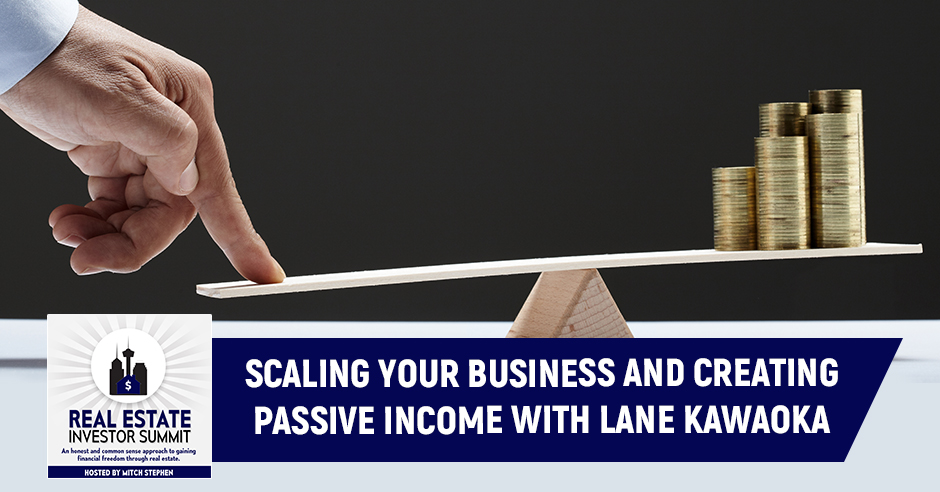PODCAST
Scaling Your Business And Creating Passive Income With Lane Kawaoka


Mitch Stephen chats with
Lane Kawaoka
Episode 403: Scaling Your Business And Creating Passive Income With Lane Kawaoka

At 34 years old, real estate investor Lane Kawaoka already has 3,500 units, mostly apartments and mobile home parks. Lane started investing in 2009 when he bought his first rental property a couple of years out of college. Today, he joins Mitch Stephen to share his real estate investing journey to financial freedom and how he’s been able to scale his business and create passive income. Lane also touches a little bit about his podcast, Simple Passive Cashflow, and his eCourse dealing with passive investments.
—
Watch the episode here
I’m here with Lane Kawaoka, and we’re talking about passive income, how to live where you want, and invest where you will. He’s out there in Hawaii. Good morning to you, Lane.
Thanks for having me, Mitch. Aloha.
I’d like to pay homage to my sponsor. If you do not have a tax-deferred or a tax-free retirement account in which you can grow your finances. Please check out TaxFreeFuture.com. We’re talking about IRAs, 401(k)s, health savings plans, and educational savings plans. All that gives you a tremendous tax advantage. You will not believe what your financial advisors are not telling you. We’re going to tell you what they’re not telling you. We’re going to tell you why they’re not telling you and then you can do what you want to do with the information. You’re going to find it interesting. Lane, give us a little background. You look like a young man. How old are you? Where did you come from and how did you get where you’re at?
I am 34 years old and I have 3,500 units. Mostly apartment and mobile home parks. I started back in 2009 when I bought my first rental property a couple of years out of college. I was an engineer. I did this work in the day job. I started with single-family homes. My first one was in Seattle, $2,200 a month rent and a $1,600 PITI mortgage. On a young twenty-something-year-old kid, that was a lot of your money. I didn’t like my job and that was where it all started. That motivation to rinse, wash, repeat, and keep doing it over and over again was there to finally quit the day job and fire the boss.
In where I’m from, that would have been an inexpensive house probably in Seattle. Is that a run of the mill house?
There are a lot of mistakes. The first rental I bought was an A-class rental and it was in the primary market. Those are two big rules that a lot of cashflow investors don’t break. Breaking those down for those people, you don’t buy in places like Seattle, all of California, East Coast, and Hawaii. The rent to value ratios doesn’t work. You’re not going to be above that 1% threshold. It is more of an A-class, that high end, we tried to stay away from. We also try to stay away from the war zone properties but going after good solid CNB assets.
Hats off to you. You started early being 34, having 3,500 units onto your credit. Also it’s probably accidental, but I’m going to assume because we do this stuff when we’re ready or was it planned? The year 2009 was a perfect time to go in and start buying stuff. It was right when the crash was happening. You got in right at the beginning of the crash. There were more than average opportunities out there.
I bought the first rental and then I bought a duplex in Seattle a couple of years later when I was able to save together another $30,000, $40,000 to buy the next one. Around 2012, the prices kept on going up and up in Seattle. I was like, “What the heck? I can’t cashflow.” I then realized, “You can’t cashflow at places like Seattle.” That was when I was forced to go to the Midwest and the South. I bought eventually eleven rentals in Birmingham, Atlanta, and Indianapolis, places where the rent to value ratios were above 1%. I had to be a remote investor at that point, working through my property managers.
Have you always been in Hawaii when you started investing in other parts of the country?
I was up in Seattle. I was working up there.
The first one you bought where you were at. You don’t just wake up one morning and go, “I’m going to do real estate investing.” Where was the a-ha moment? Who did you study? What did you see? What pushed you in that direction?

Scaling Your Business: Use property management and pay them 10% of the rents and more when you lease up a new tenant. That’s what the pros do.
I had this big house that I was proud of for about six months as a 22-year-old kid. I was traveling around for work so much. It was 100% travel. I was only home on Saturdays and it was stupid to have this big house to myself. I was like, “Screw it. I’m going to call my old landlord from college.” I had them rented it out for me and I lived off company expenses for a good couple of years. That was where I got that first taste of cashflow. That was where I realized that if I rinse, wash, repeat this again, I’d be out of the rat race.
You took notice of your college landlord. Was he renting houses out by the room for college students?
There were 4 or 5 of us in there. I did remember that they would come over on Friday or Saturday night to unclog the toilet or check up on some repair. Seattle’s always rainy and cold. His poor wife had to wait inside the Mercedes outside. It was like, “It didn’t make sense. What is this guy doing?” This is what most landlords do. They do all their dirty work. They think they’re trying to save money. If you want to scale, do it the right way, and buy, you want to use property management and you’re going to have to pay them 10% of the rents and more when you lease up a new tenant. That’s what the pros do. I think 80% of single-family homes are owned by landlords that only have one rental property. There’s a clear difference in mentality shift from landlords to investors why 80% have just one rental and why the other twenty guys can scale 10, 20, 3,000, or 5,000 units.
It gets easier the more units you have. One concentration, one place.
Part of that is if you have a rental property up in a primary market, your numbers don’t work. You don’t have that buffer to pay a professional to manage it for you so I get it.
How do you pick a good management company? That could be a do or die choice. If you have a bad management company, you’re paying for something and then it’s not even any good.
I’ve got a list of 25 questions on my website to ask, to do an interview style. I tell all my guys, “Let’s go off referrals. There’s no reason to recreate the wheel here. If someone’s not done well for somebody else, then use them.” Maybe have a mini-interview. I think the problem is most people have bad experiences with property managers because they’re going and using random guys. Those random guys are typically coming from the big brokerage houses like Century 21 or whoever. You’re getting the full bootcamp houses. They can’t do their real job. It is tough.
If you’re good at anything, it’s an art. It doesn’t matter what it is. If you’re the best at something, it’s a fine art. Do you have a family? Do you have children?
No children, yet married.
You’re 34 years old with 3,500 units. What does the average day in the life of Lane look like?
If you want to scale, do it the right way. Share on XI normally wake up not too early. It’s not like I have to wake up for a job briefing at 5:30 in the morning anymore at the construction site. I wake up around 7:00 and check emails. I’ve got to talk to my clients and my investors for a couple of hours via email. A little bit of operations, investor relations and then create my podcast. That’s pretty much a lot of time blocking, a whole bunch of stuff about the life of an investor.
You have a podcast. What’s it called?
Simple Passive Cashflow, I started back in 2016 as a means to stop repeating myself all the damn time to my friends who were asking me, “How do you buy all these properties out of Birmingham? You don’t even visit it. I don’t get it.” You tell friends what you’re doing, but nobody does anything. A few people take any action, especially now. I created this podcast. If you want to, go check out the first ten episodes. It is all about a single-family home, remote investing, but very few of them did it.
You can save your breath. You handed them the keys to a million-dollar fortune and they’re like, “I won’t watch that.” Just like everything else, it’s not for everyone. It certainly helps if you have a lot of passion for whatever you’re doing. If real estate investing is not your passion, probably just as well find something else. It’s not going to be any fun for you. You do coaching and have a giveaway for the readers. You have three modules of your eCourse that you’re giving away that has to do with passive investing. Describe a little bit about these three modules and what they can expect.
A lot of this wealth-building dogma out there, it was a bunch of garbage. They state to go to school, study hard, work at a job for 40 years, and things like retirement accounts. I don’t do any retirement accounts. I want my money out of the system so the government effectively has a lien on all our retirement accounts. They can change the rules when they want. They can tax and get the revenue out of it. This paradigm shift for a lot of investors. You’re going to retire, need that money or want to spend the money well before you’re 40 or 50 years old. You don’t want to wait until you’re 60, 65, and then look at all the stimulus plans. How else would the government go to pay it? It just inflates the money supply. Taxes are going to also be going up too. I’d rather pay my taxes on it now. Especially a lot of my investors, we go into private places and syndications where we’re doing cost segregations on the apartment complexes. We’re getting huge bonus depreciation on it. You can’t get any of that unless if you’re investing in a self-directed IRA or retirement account.
If we followed you around for a day, how are you locating opportunities all over the country? Where do you pick to go and then how do you mind in that area?
There are lots of pieces to this puzzle. One thing I don’t do well that’s critical to any investor is building relationships with brokers. In our world, the commercial world above 100 units, especially because we go up stabilized deals. We don’t go after hairy messes like 60%, 70% occupied, or less. These deals are controlled by brokers. You have got to be buddy-buddy with the brokers. I don’t like to do that personally so I have partners that are on the front line for that.
You’re not buying properties that you need to turn around. You’re just buying properties that are already stabilized. My experience with that, looking at those deals, mobile home parks, mini-storage facilities, self-storage facilities, and apartment complexes, they’re only offering these things at 5% or 6% cap rates. It seems like everybody wants to allow you to make 5% or 6% if they’re telling the truth about their numbers. I never believe anybody’s numbers. You have to prove out everything yourself, all the way to the very end. How does that work or how does that make sense that you can buy these things? Are you still getting it somehow at steep discounts?
You’re not getting steals, but you can find bargains out there. That’s for sure. The nice thing about the strategy is that you can get the Fannie Mae, Freddie Mac non-recourse debt, which is the gold standard of loans out there. I don’t like to take chances these days.
You’re talking about how easier to make money because they were getting money for apartments, 40 years fixed at 3.5% money.

Scaling Your Business: Brokers only want to sell or present good deals to people who have closed multiple hundred-unit deals in the past.
Those are the HUD loans. We closed on a deal with that loan. You have HUD loans at the top. Those are those 40-year amortizations and you have Fannie and Freddie loans. They’re at your below. There’s good and bad why you would choose one or the other. The difficult thing is HUD loan takes six months to originate the loans. You get to tie up the property for that long. It’s also costly. That’s a bad thing. The Fannie and Freddie loans, you can do your traditional two months close on that and in still pretty good interest rate, 30-year amortization. We are more in the business of buying stabilized assets that we can put maybe $4,000 or $5,000 of rehab into each unit.
New flooring, new appliances, but we don’t get into the big stuff like countertops. We’re looking to pop the rent $100 per unit, 10%, 15% lift on the rent. I don’t care about what the incoming cap rates are. If I buy it at 5%, I don’t care. All I care about is what I can do to increase it. What’s the delta? If my rents are originally $550 going in, and I know that if I do a market survey, it’s already at $600, that’s instant value right there. If I do the rehab and I make it all nice and improve the community and I can get $650, maybe at $700, that’s where you can double investor’s money in five years.
In a 100-unit complex, how long does it take to make that complete turnaround to go through every unit and get them up?
Most investors know this intuitively. Your tenants typically, 80% would probably move out in a couple of years.
You are dealing with them as they come available. You’re flipping and turning them, and then increase the rent.
It’s a hybrid strategy. We’re balancing both doing the business plan, getting people out, and rehabbing the units, but we also want cashflow too. We’re cashflowing too at the same time as all this is happening. In the summer months, turnover is a little higher, so you’re doing a little bit more units. Take a good sample size of 100 units. In the slower months, you might have maybe a few of these units coming up for turnover and you’re rehabbing the units, but in the summertime, it might be 8 to 12 units. The idea is you go through most of them in the first couple of years, and then you’re using the next couple of years to stabilize the assets. People want to buy these off of a trailing 12 or 24-months P&L so you have to stabilize the balance sheet.
This doesn’t sound unreasonable. Given the way you’re talking, you’re not looking to steal anything. You’re trying to find a certain window. How many deals do you typically look at before you pull the trigger on one?
Ninety-nine point nine percent of these deals are just garbage that some Californian would buy. They’re typically paying 10%-plus than what we would, but you’re sifting through the haystack. It’s somewhere between 100 or 1,000 deals.
I wanted to impress people. You don’t go out there and say, “I’m going to get one this week.” You’ve got to put up the numbers and pretty much everything else.
What I like about it is it’s totally different from single-family homes. There’s a barrier to entry here. You can’t call up a broker and say, “Give me a deal.” They’re not going to do that. The broker wants to close the deal. They only want to sell or present good deals to people who have closed multiple hundred-unit deals in the past. You have to have people on your team. Fannie and Freddie won’t even give you a loan unless you have previous Fannie Mae and Freddie Mac experience. It’s totally cheap. It’s a closed-loop. If you don’t have the experience, you can’t do one.
One thing that is critical to any investor is building relationships with brokers. Share on XI guess in that case, you’d have to partner with someone who had the experience.
It spins so much. It is getting more competitive these days, but it’s something that’s out of reach of most investors.
How has COVID affected your rentals?
Not one bit. Normally, we’re collecting at 97% collections. As everybody knows, you’re going to have the few deadbeats instead of 100%. April, May came along and it dipped down to 95% and then maybe at 93% at worse, but we’re right back up. Some of the assets collected even better through COVID like in Huntsville, for example.
Why is that?
I didn’t stop. It is a great market. You’ve got to pick your markets well because then it can debunk the over macro trend.
That’s one thing that’s different in a pandemic than a recession. In the recession, the blue-collar worker was probably knocked out because banks stop loaning money, and then the building stops. In this pandemic, these blue-collar workers are deemed as essential workers. They’re working and they’re booming. I feel this too in my business. I sell about 70% of my houses with 30 years fixed 10% mortgages, no balloon, no requirement to requalify. I don’t want them to requalify. I just want to make their 30 years’ worth of payments. What’s happening is, I sold eighteen houses and picked up $250,000 in down payments.
I’m selling my houses to the blue-collar workers, the air conditioner guys, the electricians, the plumbers, the carpet, and floor guys. They’re all booming because apparently, people are going home to work. While they’re sitting there, they’re getting tired of looking at that rotten deck or whatever. They say, “While I’m here doing this, I’m going to call this guy to fix this deck and I’ll be able to be here and watch him.” I would imagine if they’re booming for me to buy my owner finance houses that they’re out there quite capable of paying rents too. Even if you may have a dead beat or someone falls off, you should be able to fill it with someone who’s primed for a rental.
I was talking to my other apartment investor, cohorts, some people are affected more. To peel back the onion a little bit, blue-collar workers, you can have guys working at Burger King, Publix or Safeway. Those guys were good, but if the restaurant worker is more of an upscale restaurant that is closed like a meatpacking plant, a big processing center. Those guys might be out of work. It’s hard. Overall, the lesson learned is we are transitioning away from some of the harder class C tenants because a lot of these guys don’t have $500 in the cap savings.
They can’t even float one month. We did the same thing in the owner finance houses. We started buying a little bit better quality house in a little bit better quality neighborhood so that when there was a hiccup in the economy or something, these people could take a three-month hit and they’d still be able to pay their bills and stuff. In the lower-class C or D, one bump in the road and they can’t pay and you’re off finding another replacement. Talk to us about some of the digital courses that you offer.
I’ve got the grand master suite of passive investing. There are a few hundred hours of content in there split up in different modules. This one I’ve been creating is specifically for remote investors. It’s a relatively short course, a step-by-step to guide yourself through your first few rental properties buying remotely. If you’re buying a turnkey rental or trying to do it out of state, it’s perfect for you. Another one for people who don’t have too much money or trying to play some small ball, scrape up $10,000 a year doing these tradelines. You can put people on your authorized user slots on your credit cards that you’re not using, or maybe you’re using them and you can pick up $100, $200 a month from each person. It’s like a rental property, except there’s no down payment.

Scaling Your Business: When you’re a passive investor, there’s not much to do because the property manager runs the day-to-day.
I want you guys to go over to 1000Houses.com/lazyincome and check out what he has to offer. Pickup your three free modules from his eCourse that are dealing with passive investments. I think we can all agree, you’ve got a 34-year-old young man that has 3,500 doors. He knows something and there are a lot of people out there that would like to be in his shoes. Why don’t you take this time, take advantage of his free offer? Also check out his podcast, Simple Passive Cashflow. Who did you study? Did you just figure this stuff out? Did you do those school of hard knocks or did you get under someone’s wing?
I bought first and then I learned through doing it. When you’re a passive investor, there’s not much to do because the property manager runs the day-to-day. In my first five years, I was buying rental properties, buy and hold that cashflow. It wasn’t like I was taking huge risks. I still don’t take big risks and it’s all stuff that’s income positive.
How did you start out funding your deals?
I had a good-paying job. A lot of my clients are high paid doctors, lawyers, and engineers. My highest and best use and their highest and best use is their day job. Unfortunately, they may not like their job, but you’ve got to do what God gave you.
I have a course myself on raising private money. I have about $26 million out in the street probably as we speak. It’s the same thing. The availability of reasonable cash and terms makes the whole world go around. Do you have a section about raising capital, private money or partnering?
No, I don’t do that. If you want to pay all these other gurus $30,000 to $40,000, I’m sure they love to take your money, but I specifically catered towards accredited investors looking to be passive. You’re not going to be an underwriting specialist, but you’re going to know the questions to ask and what to look for so you don’t go into sucker deals. I have a mastermind where you build your relationships with other passive investors. As I said, referrals and relationships are what drives your investment when you get above $500,000 net worth.
Can they find information about your mastermind over there?
That’ll be in there. People that are accredited, reach out to Mitch and I’m sure Mitch can screen you and send them over. We are a secret society that makes no mistake. This is the bat cave right here.
Thank you for getting up early. It’s quite a time difference from where I’m at and where you’re at. Guys, go to 1000Houses.com/lazyincome. Check out your three free modules about passive investing. Also, check out all the digital courses that he has to offer and learn how to do this remotely. If you live in a place like San Francisco, California, or New York or someplace where things don’t seem to mesh with this kind of investing because the properties are expensive, learn how to invest wherever you want to and live wherever you want to. There are people out there doing it. If they can do it, you can do it. The difference is their mindset and their knowledge and both of those, you can obtain if you want. Get out there and get with it. I’d like to thank you, Lane, for stopping by and I’ll talk to you soon. Anything you want to say to the investors out there?
I like people who take action. If you’re going to spend the time listening to my first ten podcasts trying to get your first rental property, I’m willing to get on the phone. Take some action, put a little work into it, and email somebody out of the blue and say you want to take some of his time.
Put in some work. He’s offering all this free stuff. At least you say, “I’ve already been through all that stuff. I have some questions.” We’re out of here.
Important Links
- 1000Houses.com/LazyIncome
- 1000Houses.com/Tradeline
- 1000Houses.com/Grow
- 1000Houses.com/Livecomm
- 1000Houses.com/101
- 1000Houses.com/Coaching
About Lane Kawaoka
 Lane owns 3,500+ rental units and the leader of “Hui Deal Pipeline Club” which has acquired over $255 Million dollars of real estate by syndicating over $25 Million Dollars of private equity since 2016. Lane uses his Engineering degree to reverse engineer the wealth-building strategies that the rich use in the Top-50 Investing Podcast, SimplePassiveCashflow.com. After 12 years as a Licensed Professional (PE) Civil/Industrial Engineer, I fired the boss and began to focus 100% of my time on my investing and helping others in my Passive Investor Accelerator & Mastermind.
Lane owns 3,500+ rental units and the leader of “Hui Deal Pipeline Club” which has acquired over $255 Million dollars of real estate by syndicating over $25 Million Dollars of private equity since 2016. Lane uses his Engineering degree to reverse engineer the wealth-building strategies that the rich use in the Top-50 Investing Podcast, SimplePassiveCashflow.com. After 12 years as a Licensed Professional (PE) Civil/Industrial Engineer, I fired the boss and began to focus 100% of my time on my investing and helping others in my Passive Investor Accelerator & Mastermind.
I began investing in 2009 in rainy Seattle, being a ramen eating cheapo I was able to buy a property early right after college. After discovering the difference between ‘Cashflow Investing’ and ‘appreciation investing (gambling/speculating)’… I moved my portfolio into 11 single-family rentals in Birmingham, Atlanta, Indianapolis, and Pennsylvania. Today, I am investing in syndications that invest in Class C & B Multi-Family Apartment, RV Parks, mobile homes, and assisted living facilities because of this Nation’s demand for affordable housing – not rich people Class-A assets.
My mission is to help regular people into good deals that were once only accessible to the rich. The passive income from investing in stabilized rental properties made it possible for me to move back home to Hawaii where the cost of paradise is 10%+ cost of living and -30% less pay for comparable jobs in the US mainland. There I was able to live a lifestyle where I was able to bike to work. It did not take me long however to finally quit the day job and ditch the e-bike for a Mercedes.
- reinvestorsummit.com
- Real Estate Investor Summit Facebook
- Real Estate Investor Summit Twitter
- Real Estate Investor Summit YouTube
- Mitch Stephen LinkedIn











